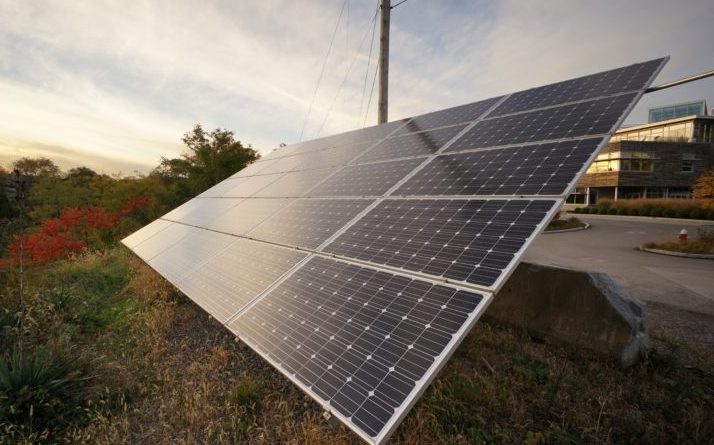Renewable Energy on the Rise
Photo By Dllu/CC BY-SA 4.0
Article by Hannah Klaus
Global energy resources have become increasingly diversified in recent years due to technological advances (6). The Renewable Energy Policy Network for the 21st Century reported that in the last year, more than twice as much money was spent on renewables than coal (5).
This is good news for the climate as solar, wind, and other renewable energy resources become more competitive in the global market and drive down the demand for conventional energy sources that emit greenhouse gases. Strikingly, emerging economies are those who are leading the way in this era of renewable energy growth. China takes the lead, accounting for a third of global investment in renewable energy. An important component of creating a more diverse, sustainable energy portfolio resources is generating energy sources that are decentralized and community-based such that the users of the energy have ownership (4).
Hydropower is the largest section of the renewable energy sector, representing 71 percent. This form of energy has seen a 30 percent increase in global capacity in the past eight year Other forms of renewable energy including solar, wind, geothermal, etc. have also seen growth in recent years (6).
The diversification of energy resources is important for the safety and stability of nations, the protection and preservation of the environment, the availability of energy for future generations, and the economy. Nations that import energy resources from abroad may become heavily reliant on these imports if they do not have access to domestic energy resources, renewable or not (2). In addition to reducing dependence on the global energy market, renewable energy resources are often more affordable over the long term and are more reliable and safer. This explains why renewable energy has been booming in developing countries that often have limited access to conventional energy resources or a secure power grid (3).
Renewable energy resources have little or no greenhouse gas emissions, thus having a minimal contribution to global climate change. As renewable energy becomes a larger part of energy market, and less greenhouse gas is emitted, there will be positive externalities in the form of improved public health and environmental quality (1). Investment in renewable energy now means that future generations will have reliable, inexhaustible energy supply. The National Renewable Energy Laboratory reported that renewable energy sources have the potential to supply 118 times the amount of energy that the U.S. currently consumes. Finally, the renewable energy sector can create jobs. In 2009, the union of concerned scientists found that if the U.S. achieved a 25 percent energy standard by 2025, three times more jobs would be created than is the equivalent amount of fossil fuels were to be produced instead (6).
Currently, natural gas is serving as a “transition fuel” as nations move away from burning coal and towards renewable energy sources. As this transition continues, it is vital that renewable energy remains a top priority for development and investment in the energy sector. Additionally, as the world moves towards an increasingly diversified energy portfolio it is vital that we develop a reliable and secure grid system that is available to demand centers far away from the sources of renewable energy and that is broad enough to continuously meet energy needs.
1.”Benefits of Renewable Energy Use.” Union of Concerned Scientists. Accessed October 14, 2016. http://www.ucsusa.org/clean_energy/our-energy-choices/renewable-energy/public-benefits-of-renewable.html#.WAEYoJMrKYU.
- Buonomo, T.J. “Energy Diversification: A National Security Imperative.” Renewable Energy World. February 4, 2014. Accessed October 14, 2016. http://www.renewableenergyworld.com/articles/2010/02/energy-diversification-a-national-security-imperative.html.
- Laurie, Guevara-Stone. “Renewable Energy Adoption Rapidly Growing In Emerging Economies.” CleanTechnica. May 06, 2015. Accessed October 14, 2016. https://cleantechnica.com/2015/05/06/renewable-energy-adoption-rapidly-growing-in-emerging-economies/.
- Neslen, Arthur. “Renewable Energy Smashes Global Records in 2015, Report Shows.” The Guardian. June 01, 2016. Accessed October 14, 2016. https://www.theguardian.com/environment/2016/jun/01/renewable-energy-smashes-global-records-in-2015-report-shows.
- Renewables 2016 Global Status Report. Report. Renewable Energy Policy Network for the 21st Century. 2016. Accessed October 14, 2016. GSR_2016_Full_Report_REN21.
- World Energy Resources 2016. Report. World Energy Council. 2016. Accessed October 14, 2016. https://www.worldenergy.org/wp-content/uploads/2016/10/WECJ4898_Resources_ExecSummary_290916_Final_WEB.pdf.

